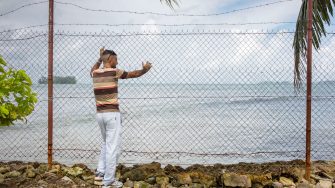Over the past decade, political debates about the ‘externalization’ of borders as a means of deterring asylum seekers have been hotly contested in Europe and elsewhere. British Prime Minister Sir Keir Starmer scrapped, opens in a new window the UK-Rwanda deportation scheme – which would have seen thousands of asylum seekers forcibly transferred to Rwanda for processing – on his first full day in office. Yet, faced with increased support, opens in a new window for far-right parties in the 2024 European elections, the German parliament is considering, opens in a new window potential models for asylum processing in third countries.
Some European political leaders have invoked, opens in a new window the Australian ‘model’ of offshore processing as a success story that could be exported globally. However, a paper by Kaldor Centre scholars Madeline Gleeson and Natasha Yacoub in the new Externalizing Asylum series, “Offshore Processing” in Australia, opens in a new window, shows that such international interest is based on misunderstandings or misinformation about the implementation and effectiveness of the policy in Australia.
Contrary to some public claims, there is no evidence that offshore processing had any deterrent effect on asylum seekers trying to reach Australia by boat, Gleeson and Yacoub write. Nor was the policy successful when weighed against other key indicators, including its cost, lawfulness, and humanitarian impact. Gleeson and Yacoub conclude that offshore processing has not ‘worked’ in Australia. Far from a model, it should serve as a warning to other countries who risk being mired in similar policy failures.
Read “Offshore Processing” in Australia, opens in a new window and explore the series, Externalizing Asylum, opens in a new window, available in German and English.
Watch the 5-minute explainer, ‘Cruel, costly and ineffective: The failure of offshore processing in Australia, opens in a new window’.


